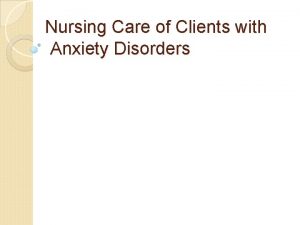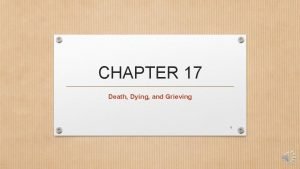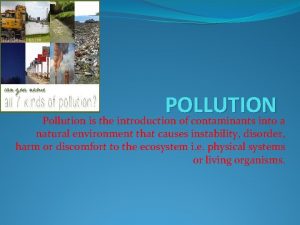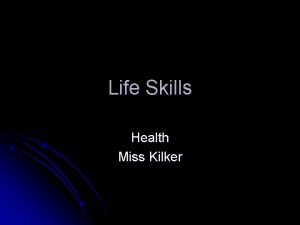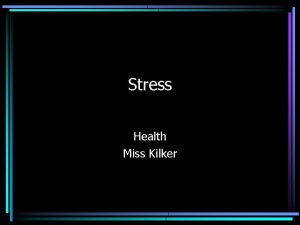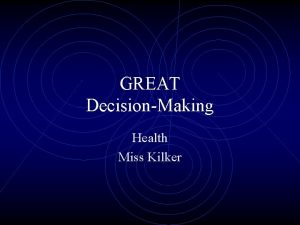The Grieving Process Health Miss Kilker Effects of











- Slides: 11

The Grieving Process Health Miss Kilker

Effects of Loss ¬ There are many forms: – Death of a loved one, divorce, death of a pet, break-up with boyfriend/girlfriend, moving from home, etc. ¬ In all forms you experience a myriad of emotions: – Sadness, anger, numbness, etc. ¬ May not be prepared for how intense the emotions are and may doubt mental stability. ¬ These are completely normal and healthy, however, if the feelings don’t eventually pass overtime, seek the help of a trusted adult.

Loss Can Cause Stress ¬ Can feel the physical and emotional effects of stress: – Examples: tension headaches, high blood pressure, irritability, confused – Must be managed or can result in serious stress-related illness

The Grieving Process ¬ To express deep sadness is to grieve. ¬ The journey to recovery is the grieving process – Includes five stages ¬ Allowing yourself to grieve is important because grieving helps you heal from the pain of a loss.

The Five Stages of the Grieving Process 1. Denial: – In denial, a person refuses to believe the loss occurred. – Denial can act as a buffer to give you a chance to think about the news. However, you must eventually reach the other stages to heal.

The Five Stages of the Grieving Process ¬ 2. Anger and/or Emotional Release: – Expressing emotions – Experiencing anger/rage is normal. You may even blame yourself or someone else. – Be careful about accusing others and use anger management skills. ¬ 3. Bargaining: – The final attempt to avoid what’s true. For example, some people make promises to change if the person or thing they lost is returned to them.

The Five Stages of the Grieving Process ¬ 4. Depression: – Sadness is natural and important. However, if feeling very sad keeps you from daily activities for more than a few days, ask a trusted adult for help. ¬ 5. Acceptance and Hope: – During this stage you begin to learn how to live with the loss. The loss continues to be painful, yet you know you will get through it and that life will go on. – Able to see the future as positive

Funerals, Wakes, and Memorial Services ¬ Different types of ceremonies take place after the death of a loved one. These ceremonies honor the person who has passed away. They also help family and friends of the loved one get through the grieving process. Different cultures and religions have different ceremonies for handling grief.

Funerals, Wakes, and Memorials continued ¬ Wake: – Allows family/friends to view or watch over the deceased person before the funeral. Viewing the body can help family and friends accept the death. ¬ Funeral: – Ceremony in which the deceased person is buried or cremated. It honors the deceased, and offers the family/friends to pay tribute to the loved one. ¬ Memorial Service: – A ceremony to remember the deceased person. It can take place long after the person has passed away. These services may also present a memorial or structure (I. e. Vietnam War Memorial, etc. )

Help for Dealing with Loss ¬ There are several things you can do to help yourself as you cope with a loss: – Get enough rest and relaxation, but stick to routines as much as possible. – Share memories and thoughts – Express your feelings by crying or by writing in a journal, poem, eulogy, etc. – If the loss was unintentional, don’t blame yourself or others. Blaming only creates a way of avoiding the truth about the loss.

Helping Others Cope ¬ Show support through simple actions, such as offering to cook a meal. ¬ Let the person know you are there for him and allow him to talk about feelings. ¬ Tell the person you have faith that he is strong and will learn to live with the loss. ¬ If the person seems depressed w/o progress, tell a trusted adult.
 Short term goal for anxiety
Short term goal for anxiety One beneficial aspect of grieving is that it
One beneficial aspect of grieving is that it Chromium 6 health effects
Chromium 6 health effects Effects of land pollution on human health
Effects of land pollution on human health Effects of noise pollution on human health
Effects of noise pollution on human health Hình ảnh bộ gõ cơ thể búng tay
Hình ảnh bộ gõ cơ thể búng tay Frameset trong html5
Frameset trong html5 Bổ thể
Bổ thể Tỉ lệ cơ thể trẻ em
Tỉ lệ cơ thể trẻ em Chó sói
Chó sói Chụp tư thế worms-breton
Chụp tư thế worms-breton Hát lên người ơi
Hát lên người ơi
